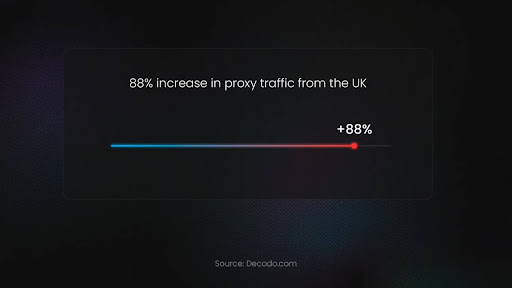Brits are turning from VPNs to proxies to resist age verification – but their data may be at risk

Sign up for breaking news, reviews, opinion, top tech deals, and more.
You are now subscribed
Your newsletter sign-up was successful
- Proxy service Decodo has seen a notable rise in proxy usage from the UK
- Brits are increasingly turning to VPNs and proxies to sidestep age verification checks
- User data may be at risk due to an absence of encryption from proxies
Proxy usage in the UK is on the rise amid the country’s controversial age verification checks. Research from proxy service Decodo shows a significant increase in proxy users coming from the UK, as Brits look to bypass invasive age verification requirements and protect their privacy.
Like a Virtual Private Network (VPN), a proxy acts as an intermediary between a user’s device and the internet. Both VPNs and proxies route a user’s internet traffic through an external server and hide their original IP address, helping access restricted content and retain online anonymity.
Proxies are undoubtedly a useful tool, particularly for businesses looking to carry out market research. Yet, the average internet user may not be fully aware of the differences between the best VPN and a proxy services, and how using a proxy could be putting their data at risk.
An 88% increase in proxy traffic from the UK

The UK’s age verification requirements fall under the Online Safety Act and have impacted not only adult sites but even social media platforms, including Reddit, X, and Bluesky.
Websites and platforms must now have age verification measures in place to prevent minors from accessing potentially harmful content. Age verification methods include facial age estimation, credit card age checks, and photo-ID matching.
Age verification is not without concerns, however, particularly for its impact on data security and user privacy. Indeed, a petition to repeal the Online Safety Act has attracted over half a million signatures to date.
Decodo, the best proxy site we’ve reviewed, has revealed a 65% increase in proxy users coming from the UK, as well as an 88% increase in proxy traffic from the country.
"More organizations in the UK are investing time in understanding the tools that power secure and efficient online operations," said Gabriele Verbickaitė, Product Marketing Manager at Decodo. "Most companies test out different solutions, providers, and do their research on proxies and VPNs, and they’re also making more informed, strategic choices."
Unlike VPNs, proxies aren’t primarily for privacy
Though proxies can be an invaluable tool for businesses and individuals alike, it’s important to understand how they differ from VPNs, particularly as it relates to privacy.
The primary concern with proxies concerning the UK’s age verification checks is that, unlike VPNs, they don’t encrypt your internet traffic. This means that your data – including the websites you visit – can still be seen by snoopers, including your ISP.
Privacy advocates have serious doubts as to whether the websites and services implementing the new measures can properly secure customer data from breaches. It appears to be a valid concern considering the numerous high-profile data breaches in recent months.

The most secure VPN providers route all of your outgoing and incoming internet traffic through an encrypted tunnel, preventing it from being seen by prying eyes. This makes a VPN the safest choice for the average user looking to browse the internet privately.
Thanks to encryption and the way they reroute traffic, VPNs are also more difficult to detect and block than proxies, making them a superior option for navigating geographic restrictions and internet censorship.
The UK body regulator Ofcom has, however, discouraged their use to avoid age verification requirements.
Despite this, there’s been a significant spike in VPN signups in recent weeks. It’s then clear that proxies are also benefiting from the UK’s increased desire for online privacy.
You might also like

Mark is a Tech Security Writer for TechRadar and has been published on Comparitech and IGN. He graduated with a degree in English and Journalism from the University of Lincoln and spent several years teaching English as a foreign language in Spain. The Facebook-Cambridge Analytica data scandal sparked Mark’s interest in online privacy, leading him to write hundreds of articles on VPNs, antivirus software, password managers, and other cybersecurity topics. He recently completed the Google Cybersecurity Certificate, and when he's not studying for the CompTIA Security+ exam, Mark can be found agonizing over his fantasy football team selections, watching the Detroit Lions, and battling bugs and bots in Helldivers 2.
You must confirm your public display name before commenting
Please logout and then login again, you will then be prompted to enter your display name.